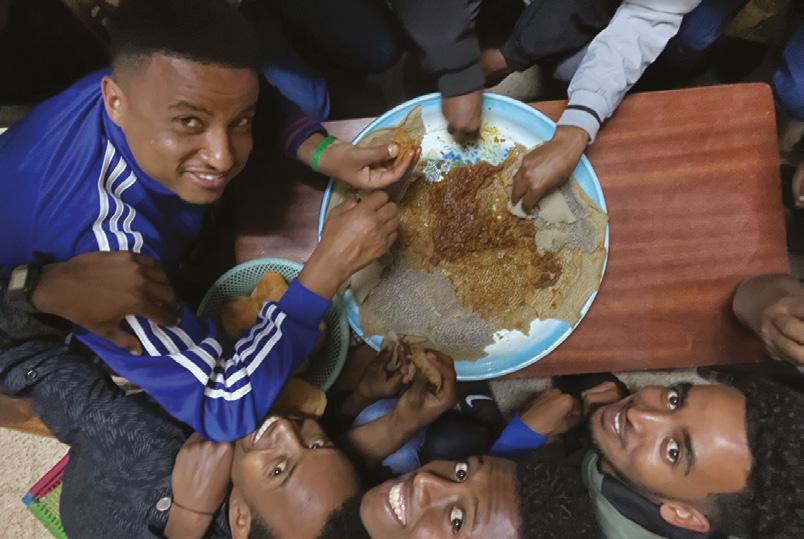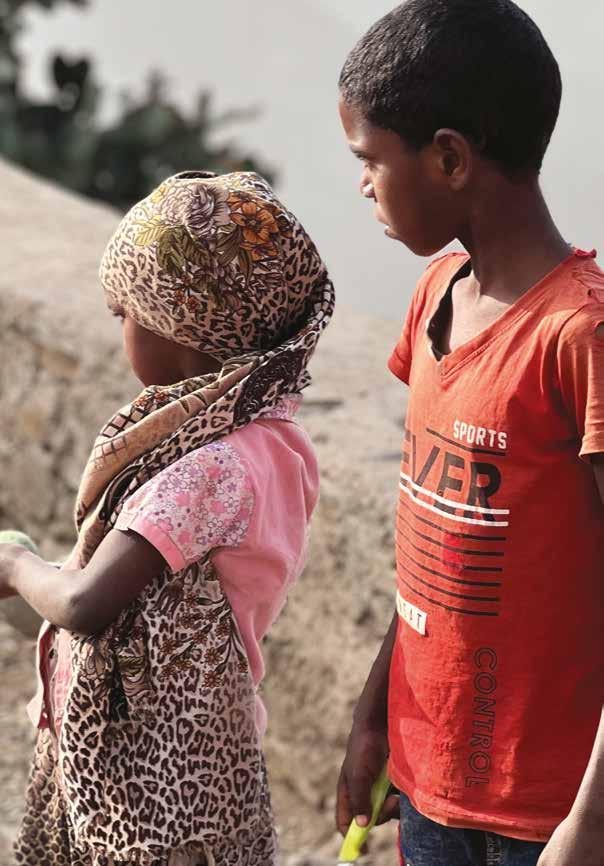






Lasallian Stories on the Road Institute of the Brothers of the Christian Schools Communications and Technology Service Casa Generalizia - Rome
December 2022
There is a long-held tradition, started by my eminent predecessors, of releasing a pastoral letter to the Brothers every Christmas. I am delighted to share with you some stories and photos, thoughts, and prayers to welcome 2023. But instead of following the more formal writing style used in official Institute documents, I opted to use the more personal and informal narrative writing style popular among blog writers. It is not my intention to devalue our rich Lasallian heritage or to trivialize our treasured core values. My sole purpose is to take on the same spirit and style that have characterized the Lasallian Conversations, which Squadra CG initiated shortly after the 46th General Chapter.
The stories here are from real encounters with persons I had the privilege to meet; sometimes, the persons and places are named, but at other times anonymized. The photos have their own stories and are not always directly related to the text. Each segment is intentionally brief, stands on its own, and may be used to start a casual talk, trigger deeper reflection, inspire some to pray, or provoke others to action. While these reflections were written principally for the Brothers, there is no reason not to share these with the wider Lasallian Family or groups beyond our usual circles who may find some use for these. As Elie Wiesel reminds us, “God made human beings because God loves stories.” All are welcome to join our caravan of story lovers. Bring loads of stories to share too. It will be a great adventure with our Everyday God, who loves stories and storytellers!
Like an uninitiated traveler on an unfamiliar road, I spent the first few months after the 46th General Chapter (GC46) familiarizing myself with the city, learning the ropes, and comprehending the mandate and responsibilities entrusted to me by the body of our Institute. I had about a week to return to my home sector of the Philippines, tidy my personal belongings, work on travel documents and do quick turnovers of pending tasks. Since May 2022, I’ve been
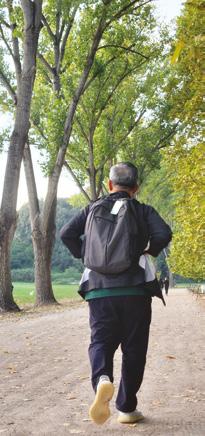
blessed with many angels unawares as the path took an unexpected turn. They offered congratulations, prayers, and unqualified support, mostly via social media. I must confess it is almost impossible to keep up with the volume of greetings, much less respond even with a short note of gratitude. I am especially indebted to those who offered real and timely assistance to multiple undertakings needed for a smooth landing on what could otherwise be a bumpy runway.
I’ve been to our Casa Generalizia, attending several programs or meetings, so it should feel like a homecoming. But it didn’t quite feel like that, as the new pathways mandated by the 46th General Chapter seemed just a little too overwhelming. By the first week of June, I was

back in Rome. Except for Carlos, our Vicar General, all the other elected General Councilors were still busy turning over pending tasks to an unwitting Simon of Cyrene. The community has always been welcoming and fraternal, even while the house structure still feels cold and imposing. It is always an endearing place to visit but intimidating to call ‘home’, at least not just yet!
I like this sign from our Rule posted on the wall of our Guausa center in Bogota: “The community is the home of the Brothers.” Should I expect to come to a new place that already feels like ‘home’? Why should I hope those there earlier would be responsible for setting the stage for a ‘homey’ feeling? I could do a bit to make even the veteran members feel this is home. Should I try to clean a dark corner of the house and make it cozier? I could attempt to cook Filipino comfort food and let some adventurous souls taste my culinary experiment. We can also do our little bit to make the new year just a little better for a brother or sister.
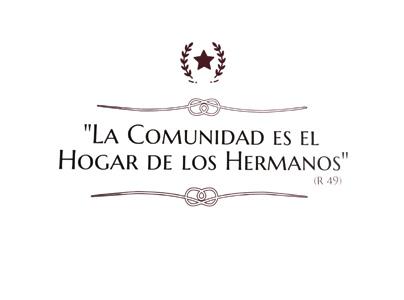

What may appear to be an unscalable mountain now seems more reachable after the arrival of Alfonso, Anatole, Carlos, Chris, Donald, Joel, Martin, Ricky, and Sergio. If I attach roles to their names, we could be very intimidating—Superior General, Vicar General, General Councilors, Secretary General, Executive Secretary, Director of Financial Stewardship. That sounds like a formidable team of superheroes battling supervillains à la The Avengers. I would rather call them Squadra CG (or Team Consiglio Generale).
We had our first sessions in Bogota in July, then regrouped in Nairobi in August to get acquainted with each other and build community. We shared our journeys, reflected on the capitular documents, dreamed together, and prayed as a community. As the weight of our communal responsibility was slowly starting to sink in, we were also trying to get acquainted with each other. It didn’t take long for me to feel we had gelled, but we were still far from becoming a super team for the mission. It would be wonderful if we could watch together this 2012 film produced by Marvel Studios and learn a trick or two from The Avengers on how to build remarkable teams:
We had the opportunity to be joined by Bob and the outgoing team—Aidan, Jorge, Tim, Paulo, Pierre, and Ricky—for a fraternal week of retreat in Ariccia and then a few more turn-over sessions back in Rome. We are grateful
that Antxon could join us, and we surely missed Gustavo and Rafa, who unfortunately could not make it. Gratitude for their services and a celebration of our fraternity were the two running themes of those graced moments together. The captivating image in my mind during that fraternal week was the graceful and grace-filled moment when the baton is passed from one runner to the next in this Lasallian race to reach the last, the lost, and the least. What a blessing to have a smooth transition. No power struggle. No egos. No resentments. Just a fraternal celebration. A magical juncture. A sacred moment.
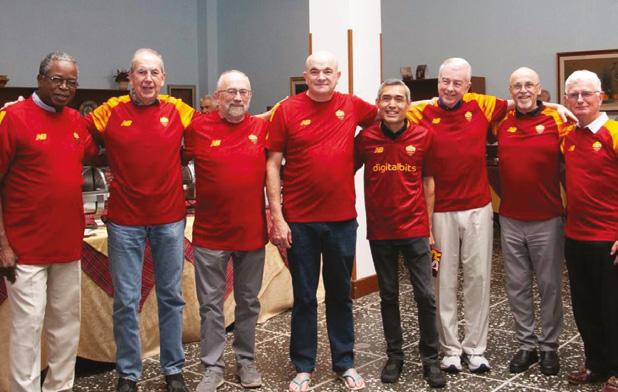
We were all warned about ferie d’Agosto and how impossible it was to be productive in Roma during the month. It was then that we hatched the idea of holding our planning sessions fuori da Roma. It is not a novel idea, as our GC46 was originally intended to be held for the first time outside of the Eternal City. But COVID-19 disrupted our exotic plans.
We could not have had a more gracious host than the District of Bogota. We could not have had a more appropriate venue for our kick-off meeting than San Jose del Guausa. The place was just mystical. The Postulancy Community gave us the warmest and liveliest welcome in the Latino tradition of abrazos fuertes y grandes. While in Colombia, we took the opportunity to visit Tabatinga and Yopal—two ministries at the fringes. It
was then that I thought this may be what Jean-Baptiste was describing when he refers to an experience of being “deeply moved.” One can almost feel the Lasallian animo pulsating in these communities. There are a dozen needs and limitations. The question of sustainability continues to hang like the sword of Damocles. The volunteers face the painful realization that the project’s impact is like a drop in the ocean of the world’s miseries. But there is a deep sense that they are doing God’s work.
We also met with those in initial formation and had assemblies in Bogota and Medellin. We listened to the hopes and dreams of Lasallians, a take-off from the ongoing synodal process. We dubbed these exchanges as Lasallian Conversations [LCs], learned much as we repeated the process, discovered profound insights in what seemed as casual talk, and were greatly enriched by those earlier encounters with fellow Lasallians. We intend to use this approach as a preferred tool to keep

our ears close to the ground in the next seven years. Before the year ends, we should have made at least 25 LCs with diverse groups and in different formats, mostly in person but also via online or hybrid.
It is essential for us during these first two quarters to get a good grasp of global trends affecting the Lasallian Mission so we can situate the seven pathways of GC46 and propose the best strategy to implement them. But neither can we be too absorbed with the big picture and lose our grounding with the communities and ministries at the grassroots. It is for this reason that we take the directives of the Rule seriously to “keep in touch with all parts of the Institute” so we can keep the animo burning, that is, that “prophetic dynamism still alive in the spiritual heritage left by the Founder”. These lines from Robert Frost speak to me eloquently: “The woods are lovely, dark and deep, / But I have promises to keep, / And miles to go before I sleep, / And miles to go before I sleep.” Before I bid farewell to Guausa, I whispered a prayer to St. Joseph: walk with us and steady our wobbly feet as you did with the Christ-child.
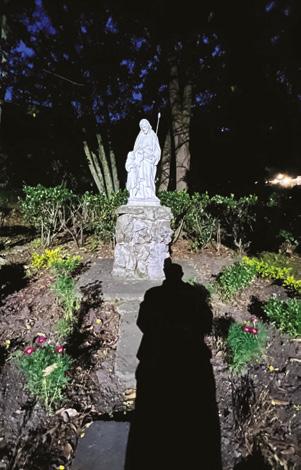
With the senior Brothers joining the assembly in Bogota and during a visit to the Parmenia community in Medellin, I struggled with what might be an appropriate and uplifting message for the encounter. I initially reminisced on the pioneering spirit of the first Brothers and Lasallian

Partners, who laid the foundations of what are successful ventures today. I was determined to focus on their core strength. Why should I make those in the twilight of their years feel dispirited?
Brene Brown urges us to embrace our vulnerability as it “is the birthplace of love, belonging, joy, courage, and creativity.” St. Paul had the same insight: “That is why, for Christ’s sake, I delight in weaknesses, in insults, in hardships, in persecutions, in difficulties. For when I am weak, then I am strong.” (2Cor 12:10).
I do not need to make a 180-degree turn when I proclaim: Blessed are the vulnerable; they will be vessels of light and life. But it may take a major paradigm shift to convince oneself that it is okay not to be okay. Opening a closed door exposes oneself to an unsympathetic eye or even public scrutiny. Still, it also opens to revitalizing light, a bigger space, and fresh air for a tired soul.
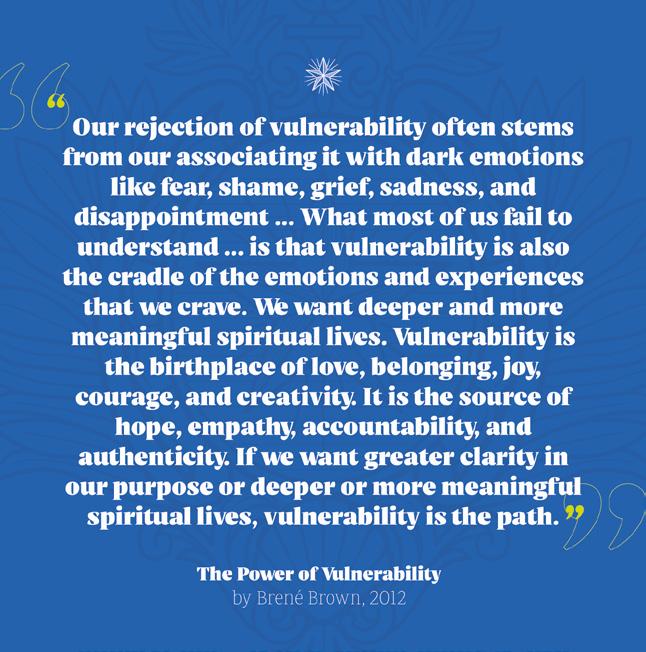

What may be the longest Christmas season in the world is celebrated in the Philippines beginning on the first day of September and lasting until just before Valentine’s Day in February. Visitors to the country may find it odd that our traditional Christmas lantern, the parol, is prominently displayed in front of the humblest abode for more than five months. The Filipino version of the Misa de Gallo (Mass of the Rooster) or nine-day novena of masses before Christmas is called Simbang Gabi (Night Mass), although it starts as early as 4:00 in the morning as crowing roosters announce the break of day. In some parts of the country, they still practice the Panunulúyan, a re-enactment of Joseph’s and Mary’s search for lodging at selected homes in the poblacion or city center with dramatic scenes of heartless rejections from some wealthy house owners.
These cultural traditions, which have become part of my skin, help me enter into the spirit of the Founder’s meditation for Christmas eve: “On arriving there, they looked for a house where they could stay, but nobody was willing to accept them, because they were occupied with people more wealthy…. more distinguished than they.” Personal
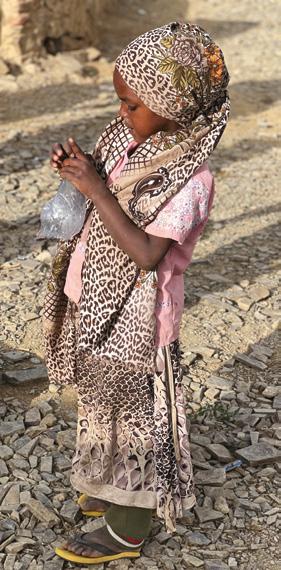
memories from past experiences enrich the drama of the Bethlehem narrative. I remember that Sunday morning more than two decades ago when I received a frantic call from a house staff member who stumbled upon an abandoned newborn in the vicinity of her residence. I had to calm her down before she could compose herself and make her next moves to rescue the crying infant. My heart fell when she appeared in our community with the rescued baby in a plastic shopping bag.
Welcoming a newborn opens our hearts—men included— to experience the labor pains of a mother. If we cannot afford to bear pain and anguish in our hearts, we cannot welcome a child in our midst. The hospitality of the heart is an indispensable prerequisite before we can welcome a child into our homes or schools. A knock at the doors of our hearts is an invitation to empathy. It is an invitation to feel the pain of the other, who may be a stranger. It is easier to keep distant and remain objective. But it is only when I have embraced the anguish of the other that he ceases to be a stranger; she is not alien to me anymore. The eyes of my heart are opened to the profound truth that he is my brother; she is my sister! When that happens, my heart is born anew.
It was late on a Tuesday afternoon when the Brother Director of a La Salle school received a phone call. It was only three minutes of conversation, but those three minutes would create a major disruption the life of the community.
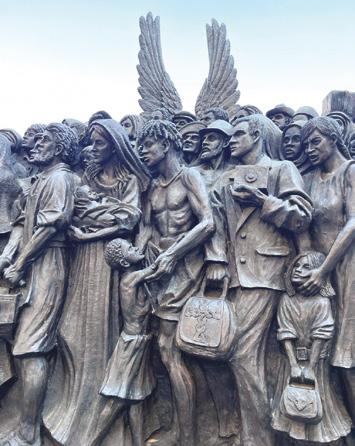
The caller worked for the state center for unaccompanied foreign minors and was commenting on the situation of one of the teenagers residing in the facility at the time. In a month, he would be eighteen years old and, by law, cannot continue to stay in the center. Without a secure livelihood and proficiency in the local language, he would be forced to live on the streets.
How many calls received can shake us, disrupt our plans and set our lives in a new direction? But only if we are attentive to the real message. Providentially, every Tuesday, this Brothers’ community meets to have a quiet time to share about how the week is going or just to share their reflections. Unsure of his Brothers’ reaction, the Director shared about the unhappy situation though mindful of the community’s limitations.
Of the five members, four Brothers are retired, with an average age of over seventy-two. Most had only a formal school experience. But they discussed openly, attentive to each other but most especially to the situation of the youth-at-risk.
That is the state’s responsibility. Someone else is better equipped to assist. We have no experience in this matter; we are schoolmen. Despite the very real challenges and complexities of their involvement, the Brothers chose to be actively involved in finding a solution to the problem. They opened the ears of their hearts to the situation of this young man. Their initial conversation led to a timely response to the young man’s woes.
In the process, the community has been revitalized. Recognizing the need to refine their shelter program, the Brothers had to spend more time to be together. They needed to put their heads together for creative solutions to this unfamiliar situation they embraced. They just thought they could make themselves helpful; they rediscovered the essence of their brotherhood instead. Simeon’s prophecy was realized for a young man in his newfound home: “Now, Lord, you have kept your promise… With my own eyes, I have seen your salvation: a light to reveal you to the nations and bring glory to your people Israel.” The same tired lines found fresh meaning in the hearts of the five Brothers the next day when they chanted the canticle just before it turned stale.
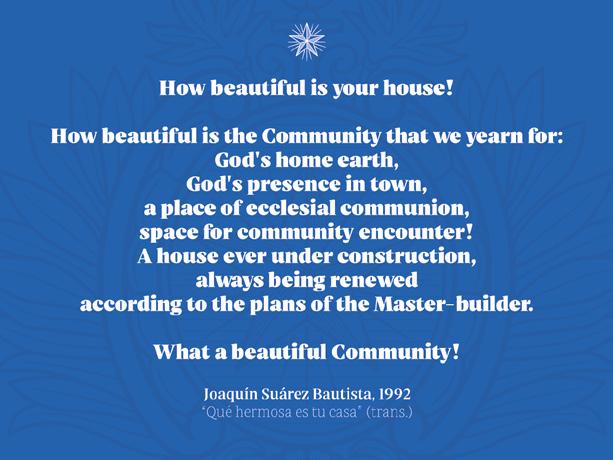
I have always loved the image of clay in the hands of the potter. Time, skill, patience, and, most importantly, creativity turn mud into art. The right material in the right hands is capable of the most beautiful transformation. The humble shepherds were the first to heed the angels’ tidings of

great joy. Their ears were open to hearing good news. Their hearts were ready to welcome the encounter. They were radically available on that first Christmas morn.
I can only imagine how their hearts were touched and how their lives were transformed after their eyes beheld the infant wrapped in swaddling clothes. De La Salle has a good description of what happens within us when we are receptive to the holy presence of God: we are “entirely transformed by the light and the fulness of grace and by the possession of the Spirit of God.” He adds that the changes in our exterior behavior come about “only as an overflowing of the happiness we enjoy in the depths of our soul… with what we should do for the love of him.” (MF 152.2).
Conversion of the heart begins from that space within as the muddy clutter in our lives is held lovingly by the Potter, shaped and tempered to a size and shape according to His heart’s desire and into a unique and unrepeatable creation. Beautiful, but yet very fragile. I once witnessed my grand aunt’s anguish when a favorite figurine in her collection was accidentally damaged. She turned her grief around the next day and tried to restore the broken piece using epoxy resin. With great devotion and amazing skill, she restored the figurine and put it back on display. She proudly asserted in our native tongue, “only a cockroach will notice the cracks.”
But it was only recently that I got acquainted with the Japanese art of Kintsugi. The origins are traced to the Shogun commander Ashikaga Yoshimasa who brought two broken porcelain cups to a reputable craftsman
for repair. His team eventually joined the pieces together in a not-so-discreet way. The fragments were glued back using urushi resin and accentuated with red lacquer and gold dust. The restored piece preserves its original form and function but with the added glory of shiny and glistening scars. To whom do we entrust our lives when we feel broken to the core?
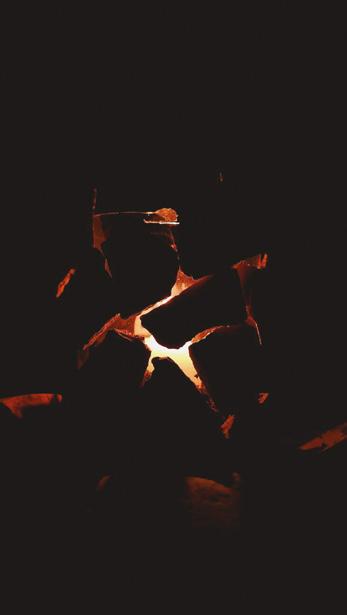
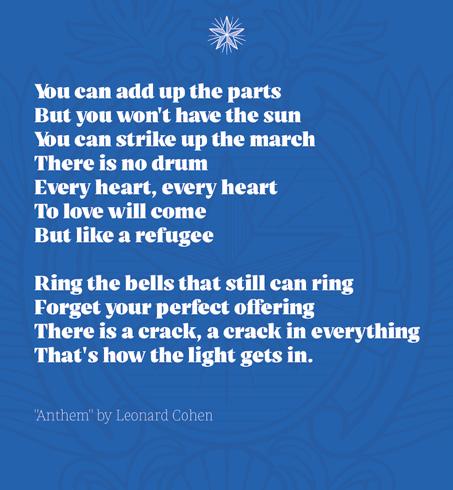
The composer of Anthem, Leonard Cohen, has encouraging words for those uncomfortable with imperfection: “This is not the place where you make things perfect, neither in your marriage, nor in your work, nor anything, nor your love of God, nor your love of family or country. The thing is imperfect. And worse, there is a crack in everything that you can put together, physical objects, mental objects, constructions of any kind. But that’s where the light gets in, and that’s where the resurrection is, and that’s where the return, that’s where the repentance is. It is with the confrontation, with the brokenness of things.”
It takes great humility and holy audacity to enter the depths of our being where not everything shines. Faced with the truth about ourselves, we uncover the cracks. We can choose to run away or delay the inevitable. How far can we hide the skeletons in our closets? How long can our façade resist the light of truth? Teachers and pastors may have unwittingly put the wise and the holy on lofty pedestals, unreachable to the unabashedly human.
Howard Jacobson is forthright on the message of Cohen’s Anthem: “It’s like a reprimand to people of my temperament— life’s complainants, eroticists of disappointment, lovers only of what’s flawless and overwrought. Could he be singing this to me? …Not everything works out, not everything is great, and not everyone must like what you like.”
In an earthy barn and on raw hay, Mary lay the Christchild. Among the nomadic herders, the angelic song found a hearth. In simplicity and poverty, our salvation
story unfolds, and God’s action flourishes. It is through our crevices that the Spirit slips through, with many of us left unawares.
It is only now that I am beginning to fully comprehend Brother Fermin Gainza’s poetic lure: “Put your lamp outside; it’s better that it be extinguished if the wind comes to it… Put your lamp outside; it is better if the wind blows it over… Put your lamp outside; it is better if your fingers burn with it… Put your lamp out; it is better if your oil is used up and you have nothing to consume.”
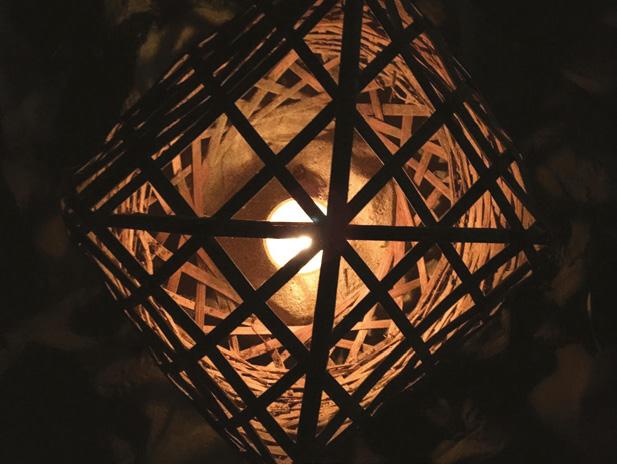
This was my immersion into the Ge’ez liturgical rites of the Alexandrian tradition. I joined the Brothers for daily morning masses before sunrise at the nearby parish church. It was a much longer rite than what I was used to and in a language foreign to me. The rites, vestments, incense, and chanting were captivating for the uninitiated. I made it through the ritual without dozing off. At breakfast, I asked if the words Qədus, Qədus, Qədus were the equivalent of our Trisagion prayers or the familiar English hymn, “Holy, Holy, Holy,” in the Latin rite. The Brothers were very surprised that I recognized the Ge’ez prayer, but I admitted it was just an educated guess after hearing the triple Qədus repeated for what seemed a hundred times during the mass.
It just dawned on me that the experience of a meaningful liturgical celebration does not require the participant to be proficient in the particular language or spoken word of the congregation. Like music in a dance, one needs to let the rhythm lure one into the mystical encounter. Music and art communicate directly with the heart. And also with our hands and feet. In the same liturgy, I heard for the first time the ululation by the women in the congregation after the consecration as though a flock of noisy birds suddenly entered our sanctuary. One can’t help but feel that one has stepped into a sacred space. I was fascinated by seeing an old lady across my pew crouched to the ground while holding her rosary beads in silent prayer.
This sense of the holy may not be as discernible in societies where cathedrals are loftier, and the state takes the task of putting order in society and providing social services to its people. Why doesn’t such a world—freed from dehumanizing pain and suffering brought about by poverty and deprivation—give us an experience of the divine? Secular societies, more often than not, engage people in a race to acquire more power, wealth, or fame
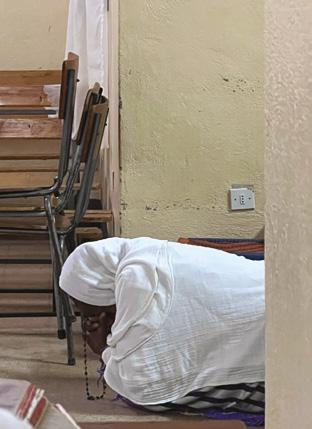
without this uplifting sense of the divine. It promises individuals a life of comfort and leisure, freedom and prosperity, abundance and happiness on earth. The state or civil society takes on our educational mission as part of state duty, philanthropy, or humanitarian task. Sadly, in these same secular societies, faith is reduced to irrelevance and left without a prophetic voice or presence. In many such places, the Church and the Institute look old-fashioned and out-of-touch with reality. In a world that is increasingly individualistic and materialistic, may a Christian school provide young people with new “eyes of faith” to look at their lives and the world? We must pay renewed attention to how we look at reality and our existence. It may be the look that saves.
Today more than ever, we must accept with creative fidelity our responsibility to nurture spirituality. Spirituality today is sought even by unbelievers. It is no longer strange to realize that we share with André Comte-Sponville, the renowned atheist philosopher, that we can only combat the ephemerality of life by opening ourselves to eternity.
Pope Francis in Laudato si’ [LS] teaches that “human life is grounded in three fundamental and closely intertwined relationships: with God, with our neighbor and with the earth itself.” (LS 66). But these relationships are compromised when our starting point is exclusionary conquest in the name of freedom since “…human beings are not completely autonomous. Our freedom fades when it is handed over to the blind forces of the unconscious, of
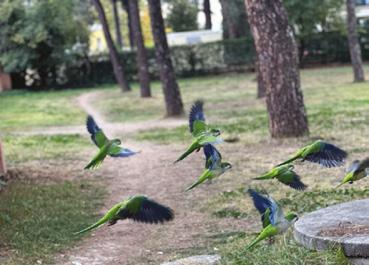
immediate needs, self-interest, and violence. In this sense, we stand naked and exposed in the face of our ever-increasing power, lacking the wherewithal to control it.” (LS 105).
By our inaction in the face of climate change, we are contributing directly to the very abolition of our humanity. This was the same message of Swedish teenage advocate Greta Thunberg in COP24 to politicians and entrepreneurs: “I will be 75 years old in 2078. If I have children, they might spend the day with me and ask me about you, and why you didn’t do anything while there was still time to act. You say you love your children, but you are still robbing them of the future.”
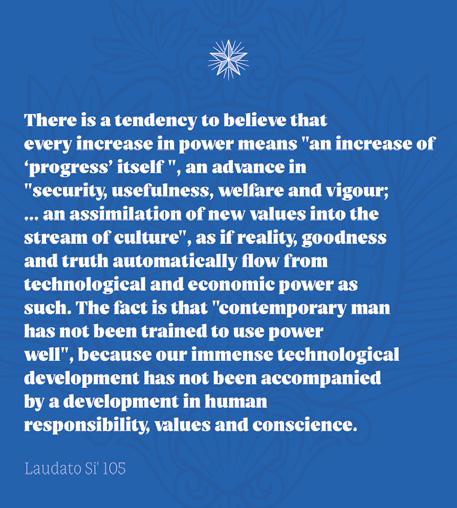
How may one begin to address this urgent universal issue if I do not see myself as powerful or influential enough to make a difference in our world? The synchronized cloud of movement of starlings, called murmurations, may give us some inspiration. Not dependent on just one starling to choreograph the stunning sky show, murmurations are created when one starling copies the movement of the other starlings beside it and then this is repeated until the entire group moves as one. It doesn’t always require an original creation. Our one legacy may in fact be a group legacy, done together and by association where the real influencers, movers and shakers are lost in the crowd. In an age of copyrights and patents, this may well be the conversion that could save our world.
A Brother was lucky enough to watch recently this magic show in the sky and sent me a video clip. Our small, seemingly insignificant steps may in fact be the fertile soil that will nurture the critical mass capable of transforming our world. You may wish to check this link and learn a few more tricks from starlings:

In a recent visit to one of the most isolated sectors in the Institute, the recent take-over by government authorities of the last school we were managing was the hot topic of my visit. But it was in that setting that I felt a different kind of “animo” among the Brothers who were left with almost nothing: no Brothers’ residence they
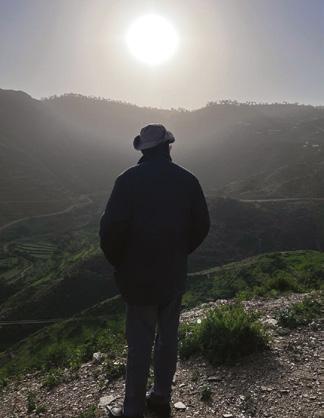
can call their own, no educational institutions to run, no official youth ministries to engage with. It was in this situation that I understood what it means to abandon oneself totally to the Lord who will never abandon us. I thank those Brothers for teaching me in so many simple ways, but in very real ways, how our brotherhood can be shared during the most difficult of times.
As the Brothers gathered to share with me their very challenging situation, they did not end with a sorry note. After giving me a comprehensive report of the current state of affairs, they presented a plan to start new ministries outside of traditional institutions by opening student centers in some of the most depressed areas in the country, maybe in abandoned houses or facilities or even under the shade of a tree. They did not beg for financial help from the center of the Institute. I felt a deep resonance in my heart when a Brother addressed the assembly and reminded everyone that we may not always be in control of our situation but the situation does not determine nor define who we are. He firmly asserted that what defines us is our response.
De La Salle’s response to the early threats to the Lasallian project of schools was to make a solemn vow together and by association with the Brothers before the Most Blessed Trinity. They promised to remain committed to the call even if they had to beg or live on bread alone for the rest of their lives.
A Brother in his senior years urged the congregation to raise funds in support of their new ministries from local
sources and not be too dependent on foreign subsidy. He even pledged to work as a courier delivery man in case they run low on funds. Another Brother shared that he made a decision to stay in the country even if he has opportunities to get a visa for residency abroad since he would rather suffer and weep with his people to show his solidarity with them rather than just pray and watch from outside. It became clear to me that this community of Brothers may not have made the same heroic vows but they have certainly been living their vows heroically for the past 40 or so years. I told them I would share their story with the rest of the Institute so we can capture how holy audacity is lived even today.
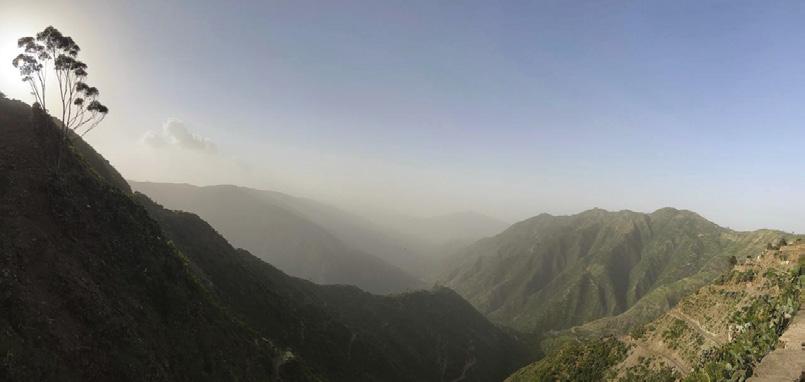
It was not unexpected yet when he reached his 65th year, Brother Xavier’s birthday celebration seemed bittersweet. He had accepted the fact that he had to retire from classroom teaching. But he still felt physically and mentally capable of going to his science class every morning. In a sense, he was looking forward to his retirement after four decades of giving his all:

weekends sacrificed to prepare for lessons, graduate studies delayed, sabbaticals unheard of.
No one in the community or among his colleagues in school suspected that there was this deep indescribable pain as though an arrow pierced through his heart. But he went along his merry way thanking them for the despedida party and the nice missionsending greetings that looked so pretty on Hallmark cards. Why would he bother to share what he was going through? He didn’t even know what hit him.
There was no question that the soft whisper to be faithful to the call he first heard was still very much alive in his heart. He just needed to look for some other way to channel the remaining energies which were somehow kept at bay by his greying hair and wobbling steps. Somehow, he felt the same vigor within as when he was in the novitiate. Except for a hoarser voice, he can still say with conviction, “I burn with zeal for the Lord, the God of the Universe” (1Kings 19:14).
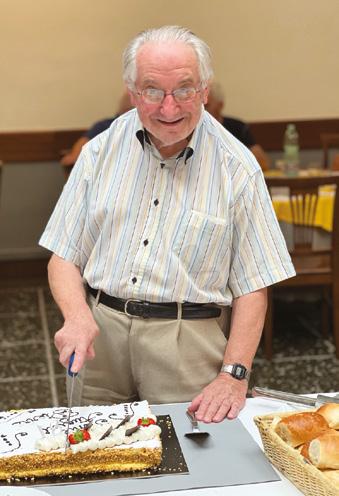
In due time, he adjusted and new pathways opened up. Recently, he has been tutoring a handful of students struggling with mathematics and science. A couple of parents have visited him recently for casual chats that lasted longer than expected. And for some reason, they were pleasant and not forced. He never considered himself a green thumb but he has been more appreciative these days of the different species of flora that are blossoming in the school garden. He just stuck a few cuttings on a pot and, miracle of miracles, they’re beginning to sprout. Without actual designations and official assignments, he still feels his days are productive and well-spent. What a joy to be a Brother!
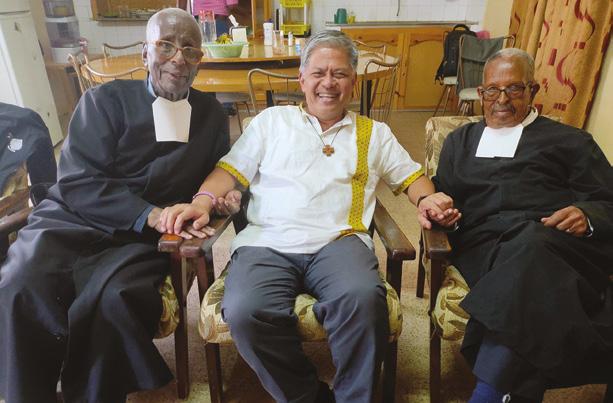
He never really expected anyone to ask him that question, least of all from a boy of barely 8 years right in the middle of the school playground. He was certainly a special boy.
In his last religion class, they were discussing how Jesus was very sensitive to the needs of the hungry, thirsty, and those who
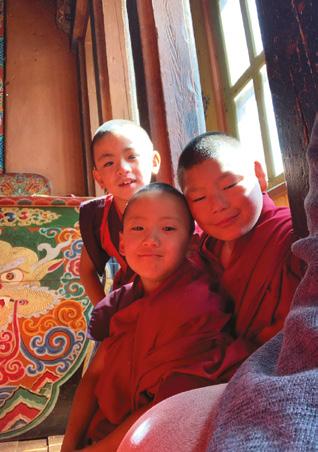
“How many poor people are you friends with?”
are sick; the strangers, widows and orphans. He even emphasized to his students Jesus’ invitation to go out of their way to approach those who are most in need and to help those who have no means to repay them.
The child’s question puzzled him. Aside from helping, could he approach the needy person and even consider him or her a friend? It was a question that disturbed him enough to trigger a longing to enter an experience that would transform his life. He was honestly terrified with the thought of reaching out to a needy person beyond giving alms or assisting in his or her needs. He felt a discomfort becoming too personal or investing more time and energy than the situation requires. Deeper reflection on his dilemma made him more aware of “the divorce between the sacrament of the altar and the sacrament of the poor.”
He couldn’t do it on his own, so he decided to join a parish group with an immersion program to areas in the city not frequently visited by local leaders including from the Church. He was very aware of his discomfort and fear and that was why it was so much easier to join this group than organize one on his own. His anxieties
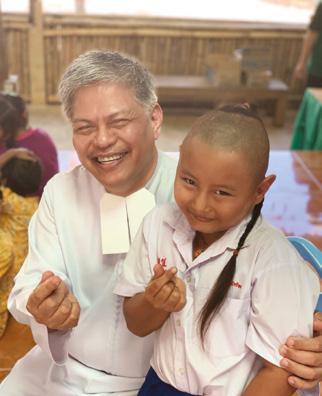
seemed too basic and trivial for he felt awkward greeting them with a simple “hello.” But after the ice-breaker, the next steps were easier than he thought. Pretty soon, the stories and the laughter, the handshakes and hugs would come naturally. Beyond distributing relief goods and other household necessities, warmth and friendship came without much effort.
He has throwback pictures in his memory of those first awkward moments before the stranger turned brother and friend. Today, he can walk through those unlit corners of the city and feel very secure and comfortable meeting friends and neighbors. The stereotypes described in the news headlines of the local papers don’t match anymore. They are not unnamed prostitutes, drug addicts, drunks, and thugs. He can call them by name: José, Lola, Yan, Pepe, Helena, Miguel Ángel, Dani, César, Nereida.
Reflecting on the loss of a Paris landmark, Alissa Wilkinson realized “that everything that seems permanent could go away. It is frightening, in an existential way… It’s not just that nothing lasts. It’s that when things are lost, part of our memory, both collectively and individually, begins to fade away. There’s a kind of sacred solemnity to that realization, even if

you’re not religious. History and memory are bigger than us. And a building like Notre Dame… is where we deposit some part of a shared history, in all of its messiness and failure and glory.”
We experience these little losses and deaths many times over. When an initiative is swept aside by the next administration. When a dear friend and brother chooses to leave the congregation. When an innovation in which I am invested has not passed the board’s approval. When my youthful, idealistic plans are dismissed by my superiors as not worth the risk. When what I have expended almost all of my energies in do not seem to be appreciated by the District. When in my retirement years, I have this nagging feeling not only that I have nothing but that I am nobody.
When the world as I know it is falling apart, then what am I called to do? Who among the opposition leaders can reverse the tide of populism? Is there hope for the world?
American activist and historian Howard Zinn may provide us some helpful insights: “To be hopeful in bad times is not just foolishly romantic. It is based on the fact that human history is a history not only of cruelty, but also of compassion, sacrifice, courage, kindness… What we choose to emphasize… will determine our lives. If we see only the worst, it destroys our capacity to do something. If we remember those times and places—and there are so many—where people have behaved magnificently, this gives us the energy to act, and at least the possibility of sending this spinning
top of a world in a different direction…
We don’t have to wait for some grand utopian future… To live now… in defiance of all that is bad around us, is itself a marvelous victory.” Do
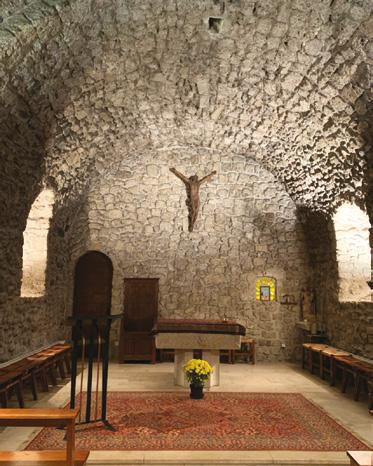
In the Aula Magna where the AIMEL delegates gathered this year in Rome, I proffered a study in contrasts: In the same great hall hangs the photos of all the Superiors General through more than three centuries of the Institute. They all wear the same religious habit—a black habit with
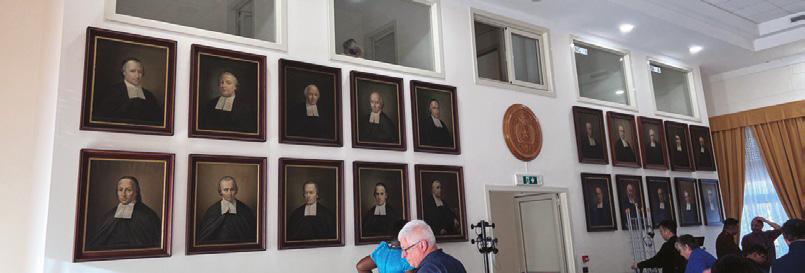
a rabat. They all look a little too saintly or stern for us. Huddled in small groups or meeting in plenary are the delegates to the third international assembly of Lasallian educators. It is obvious that they come from different cultural backgrounds and traditions; they don’t have the same color of hair or the same color of skin. They have different eye shapes and their attires are as varied as the colors of the rainbow. There are women and men, young and old, religious and lay, married and single, but each adhering to one’s responsibility to be the ‘heart, memory and guarantor’ of the Lasallian mission beyond 342 years.
In the Rome sanctuary of St. John Baptist de La Salle is another study in contrasts. In a place of honor are the precious relics of our holy Founder: his dry bones. In the same sacred space Lasallians from far and wide also come together with their hopes and dreams, their anxieties and their fears, their noblest aspirations all woven into their human frailties, but always with ever pulsating energy. On occasion, the assembly includes Lasallians from other faith traditions but also agnostics, atheists or those who profess no religion. In their living hearts reside the same dream that was once embodied in those dry bones of John Baptist during his lifetime.
Along the ancient Roman road of the via Aurelia is our Casa Generalizia—stately, massive, imposing. Another study in contrasts. Numerous portraits and memorabilia are displayed in its chambers and aisles. They proudly showcase milestones of yesteryears, distinguished personalities and historic moments: moldy dreams of a glorious past. Strutting along its corridors or chatting in a
corner are common folk: noisy, casual, cheerful, spirited. They speak excitedly of modest plans and small steps to create a world that is safer and greener and kinder.
Something is afoot in the universe. It is a new springtime for the Lasallian family. And we are all architects of this new creation. Celebrate new wine in new wineskins. Protagonists. Prophets. Creators.
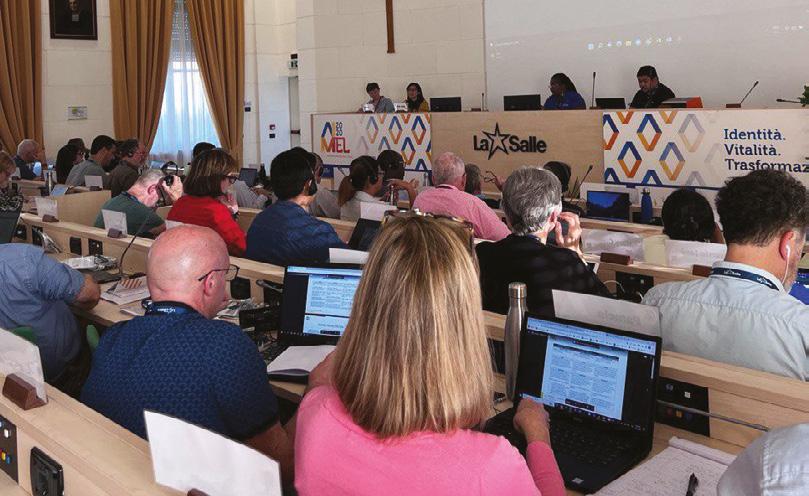
The real challenge of the 46th General Chapter is not necessarily on initiating new projects with the greatest impact to change our world. It may in fact be in creating opportunities for every Lasallian to look at everything with the eyes of faith. In faith, we recognize that we are called not to build OUR Kingdom, but to contribute our

small, insignificant efforts to build God’s Reign. In faith, we remind ourselves that we do not need to create new ministries or build new institutions from a position of power or strength. The Reign of God is like a mustard seed…
Let us look at the example of Mary, a young maiden who would surely have thought herself insignificant. That which she embraced with her fiat was disruptive of whatever personal plans she may have at that time when the angel brought her the message. The greeting shook her very being. She who was “full of grace” still felt totally vulnerable and she had to ask, “how can this be?” But, “like a man who sets out to sea without sails or oars,” she made herself radically available: “I am the Lord’s servant. May your word to me be fulfilled.”
We need not have the assurance of big resources to start reaching out to those who need us most. We can offer our widow’s mite and share from our need instead of our excess. We need not have the guarantee of an institution that outlasts time but instead trust fully that if this is God’s work, it will last. We do not need the endorsement from the rich and famous to do God’s work. We can work from the peripheries and hide in anonymity like yeast that works effectively without creating much fuss.
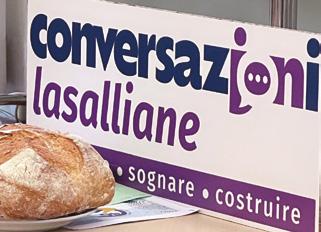
As I was writing this reflection, a young Brother knocked on the door of my office and interrupted my thoughts only to let me know that he was passionately interested to volunteer for the missions. He shared his dreams of teaching in a classroom in a remote area where there was great need.
The yeast has caused the dough to rise. We shall share the bounty of the Lord very soon!
